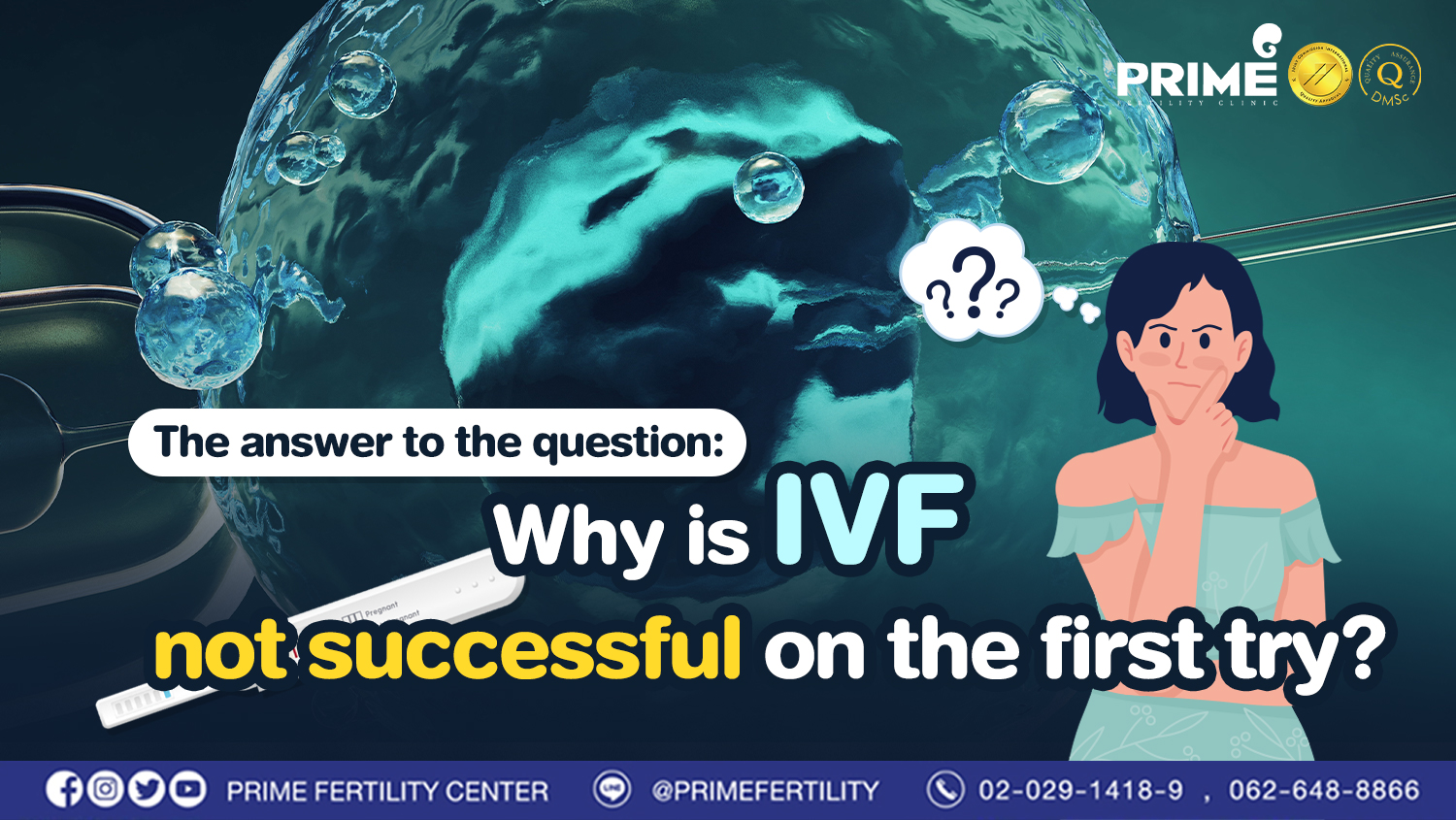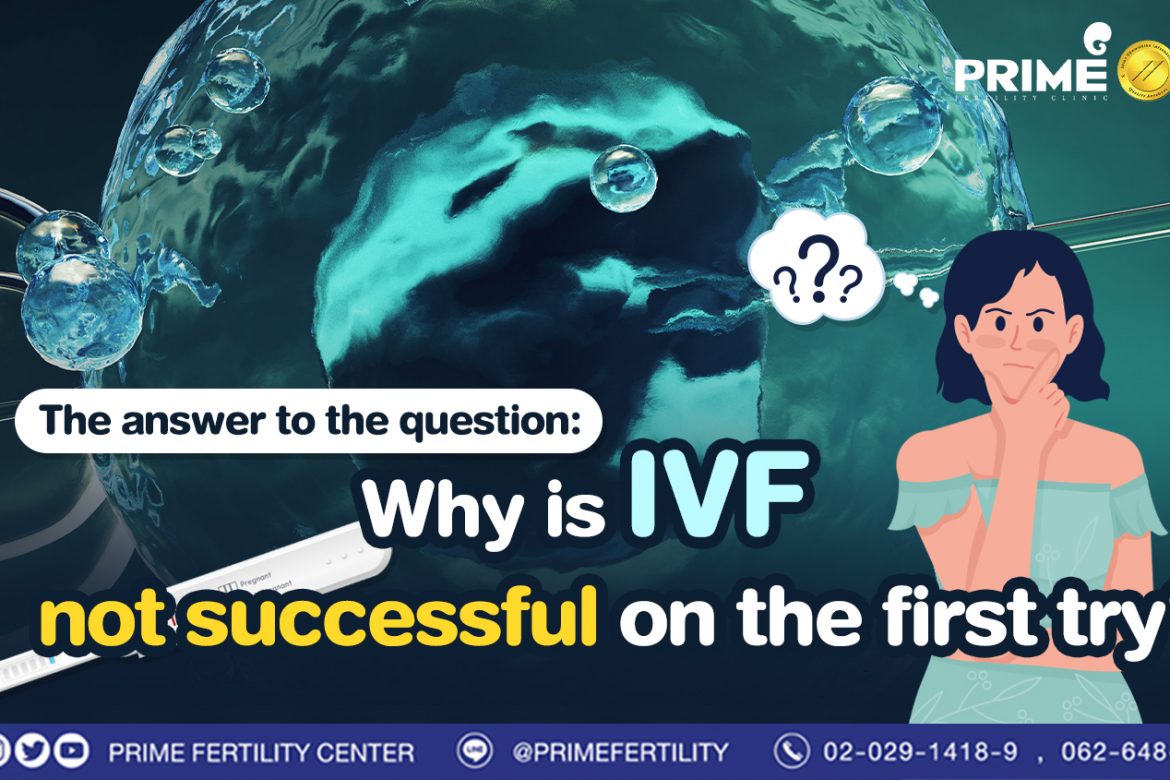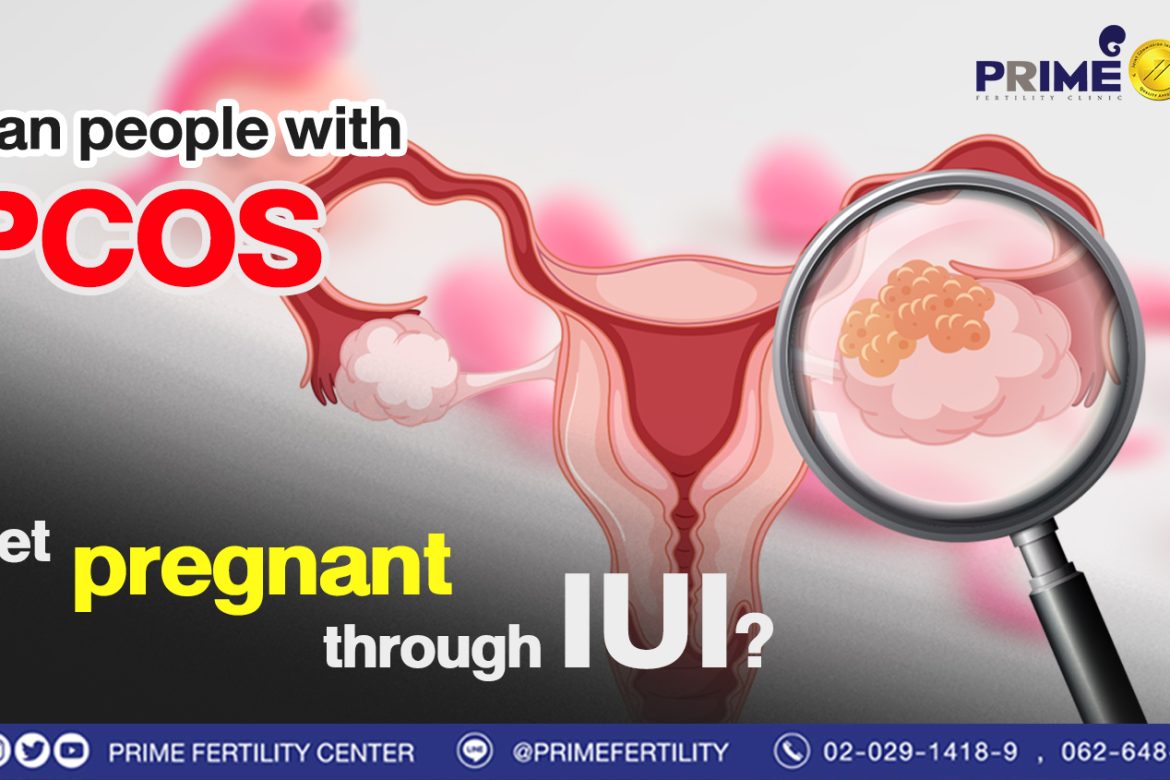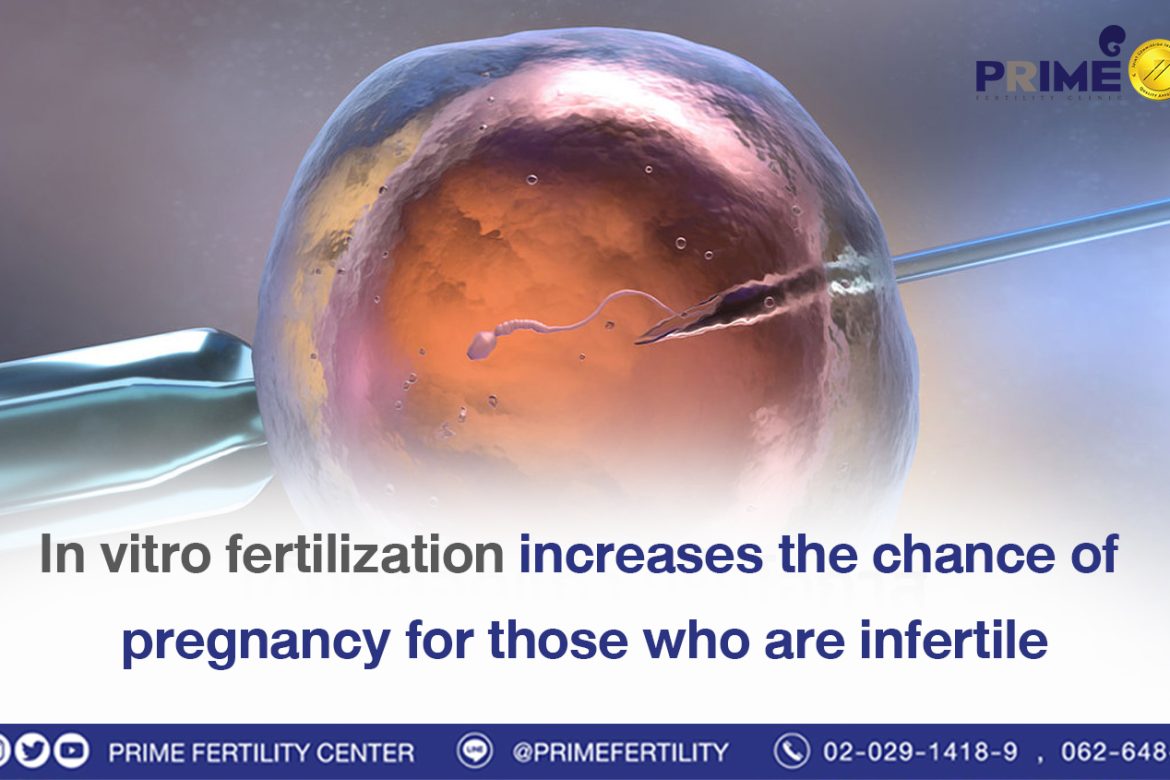The answer to the question: why is IVF not successful on the first try?

Meta Title: The answer to the question: why is IVF not successful on the first try?
Meta Description: Get to know in-vitro fertilization methods: IVF and ICSI. How different between 2 methods? Which one is better? What are the reasons of failed IVF on the first try? Let’s find out the answers of these questions through this article!
———————————————————
If you are a married couple who have been struggling with natural pregnancy or have failed in the first IVF attempt, you might read this article!!!
HDmall.co.th together with Prime Fertility Center will introduce you to “In-vitro Fertilization”, a familiar treatment to treat infertility. In this article, we start with the meaning of in-vitro fertilization, difference between IVF and ICSI, success rates of IVF. Finally, tips for a couple to achieve IVF on the first try.
What is in-vitro fertilization?
In-vitro fertilization (IVF) is a treatment to treat infertility using the assisted reproductive technology. The procedure is to extract a female’s mature eggs out of ovaries and combine with a male’s sperm in laboratory for fertilization and developing to an embryo.
Next, the embryo is cultured in a suitable environment inside laboratory. When it is the right time for embryo transfer, the embryo will be transferred to the uterine cavity to let it implant with the uterine wall and develop into a fetus later on.
IVF is very suitable for people with infertility and couples who are planning for pregnancy. It not only helps increase the chance of pregnancy but IVF also enables preimplantation genetic testing in an embryo to screen some genetic disorders like down syndrome or thalassemia.
Moreover, if a female is not ready to get pregnant soon, she can proceed with egg freezing or oocyte cryopreservation. This procedure can stop aging and maintain the same quality of egg cells as of the female’s age when collecting the eggs.
Difference between IVF and ICSI
Nowadays, there are 2 methods of in-vitro fertilization: IVF and ICSI. Both methods are not quite different during the initial stages. After fertility checkup and counselling, both IVF and ICSI start with ovarian stimulation. A female needs to receive hormone injections to induce the body produce multiple eggs. As well as the medications to prevent the ovulation take place earlier than the scheduled time.
Next, ovum retrieval is performed through vagina by using a medical tool to extract female’s eggs out of ovaries together with an ultrasound scan to guide the procedure site. After that, the eggs are placed in a nutritive liquid (culture medium) before the strongest and the most perfect eggs are selected for in-vitro fertilization.
The process of fertilization is different between IVF and ICSI as follows:
- IVF (In-Vitro Fertilization): Some sperm are placed together with each egg. Then let the sperm penetrate the egg on its own.
- ICSI (Intracytoplasmic Sperm Injection): It is the second generation of conventional IVF by using more modern assisted reproductive technology. Only 1 best sperm with the best quality in terms of morphology and motility is selected and injected directly into one egg. This method provides higher success rates than IVF.
Success rates of IVF
According to the American Pregnancy Association, success rates of IVF by age are as follows:
- 41-43% for women under 35
- 33-36% for women aged 35 to 37
- 23-27% for women aged 38 to 40
- 13-18% for women over 40
The success rates of IVF and ICSI are very slightly different. But both methods are obviously different in the process of fertilization.
Apart from a couple’s age, the success of IVF also depends on several factors. However, only 1 best embryo is selected and transferred to the uterine cavity.
What are factors that influence the first IVF to fail?
- Female’s age
It is directly associated with eggs. Particularly, when a female is over 35, the hormone that can be produced normally decreases gradually, leading to the diminishing of ovarian performance and egg quality.
There is 25% of unqualified eggs in women aged 25, 50% for women aged 35, and 85-90% for women over 40. In addition, female’s age also affects the fertilization process in ICSI.
- Male’s sperm
According to WHO standards, the normal ranges for sperm analysis are:
- Sperm volume = 1.5-5.0 ml
- Sperm concentration > 15 million / ml
- Total sperm count > 39 million
- Sperm motile > 40%
- Normal sperm morphology > 14% under strict criteria
In case the test result is lower than the above standards, it will be difficult to get pregnant by natural method as the number of sperm is not enough for fertilization in a female’s body.
This is likewise ICSI. Poor sperm quality leads to a lower fertilization rate and poor implantation as well as a greater chance of miscarriage.
- Embryo with abnormal chromosome
It is caused by incomplete cell division or either party is a carrier of some genetic diseases which can’t be detected by eyes.
Nowadays, a genetic testing called “PGT” is used to identify an embryo’s genetic disorders caused by the number of chromosomes or some specific genes before embryo transfer. It helps reduce the risk of genetic disorders in a fetus.
A technique called “NGS” is also used to detect chromosome abnormalities. It is deep screening into base sequence which is a smallest component of chromosome. NGS provides high accuracy and thoroughness in detecting chromosome abnormalities. It has been developed and applied to the embryo’s genetic testing which known as the best technique at present.
- Uterus and endometrium
After an embryo fully develops, it will be transferred into the uterine cavity. In case of poor endometrial conditions, it is difficult for the embryo to implant. Endometrium with good conditions must be as follows:
- 8-10 cm thickness
- Triple lines arrangement
- Clear
- Warm due to a sufficient blood circulation
- No uterine fibroids, twitching, or pelvic inflammation
A thin endometrium is mostly caused by low progesterone production. The doctor may advise taking hormone medicines to help the lining grow and be thick enough for pregnancy.
Inappropriate IVF treatment
IVF and ICSI have different procedures and have been created to solve different problems of infertile people. Choosing the method that is not suitable for your couple may affect the success of your IVF attempt.
In IVF, some sperm are placed around an egg and the sperm combines the egg on its own. Success rate of IVF is 30-60%. It fits for men with good sperm quality but women may have blocked fallopian tube or abnormal endometrium.
In ICSI, only one best sperm is selected and injected into one egg, making the fertilization rate up to 70-85%. It is suitable for young women whose eggs are potential in terms of quality and quantity, don’t have endometriosis but men have poor sperm quality, low sperm count, or retrograde ejaculation.
However, a couple who have failed in other fertility treatments like IUI and IVF, the doctor will evaluate the medical history and consider treating with ICSI as a better treatment providing more effectiveness.
Ways to increase the chance of successful IVF
Doing IVF is a great hope of people with infertility because everyone wants to succeed and have a baby on the first try.
So, patients should follow these guidelines before and after doing IVF in order to get ready and increase the chance of successful treatment.
Before IVF
- Get a checkup: Blood samples are collected to screen the genetic diseases, underlying diseases, and to evaluate hormones that are necessary to egg stimulation. Ultrasound scan is also performed to assess ovarian and pelvic conditions as well as the risks of genital abnormalities.
- Eat healthy foods: Taking nutritious foods will help strengthen sperm and eggs. Recommended foods for women are leafy green vegetables, whole grains, berries. And foods for men are eggs, chocolate, bananas, pomegranates, and berries.
- Control body weight: Higher or lower BMI than standard level can affect fertility. Especially, being overweight can cause body’s inflammation in men easily, leading to poor sperm development and less ability to fertilize.
- Avoid smoking and alcohol: Both things cause less sperm quality, damage DNA of sperm, and reduce the chance of successful embryo implantation in a female’s uterine cavity.
- Sleep sufficiently at least 7-8 hours per night. It can help increase the chance of pregnancy because having enough sleep makes the body repair many functions and maintain hormone balance of sperm. For women, the endometrium will be in a good condition and ready for the implantation of embryo.
- Not having sex before sperm collecting: About 3-4 days prior to the day of sperm collecting, men should refrain from having sex or masturbation. This is to be able to collect a lot of sperm in a sufficient amount on the collecting day and to select the best sperm for IVF.
After IVF
During the first 7 days after the embryo transfer, a woman must take care of her health very well by following these tips:
- Properly move the body, avoid any physical activities that require standing or walking for a long time as well as avoid driving or a long-distance travel.
- Avoid doing hard activities, such as hard working, carrying heavy objects, or doing an exercise that involves the contraction of abdominal muscles.
- Eat healthy foods: Should consume the foods that are easy to digest to reduce the chance of constipation as it may cause abdominal contraction all the time.
- Sleep sufficiently: Should sleep at least 7-8 hours a night in order to maintain hormone balance and increase the chance of pregnancy.
- Not having sex about 14 days after embryo transfer for the best outcomes.
- Strictly follow the doctor’s prescription for both oral medications and vaginal suppositories in order to thicken up the uterine lining for the implantation.
Moreover, there will be another doctor appointment for pregnancy test after the embryo transfer by evaluating hCG level (Human Chorionic Gonadotropin) or a hormone of pregnancy. In case of negative result, a patient will be informed to stop taking medications. To try IVF again, it will take about 1 month to allow the uterus being ready for the next cycle.
Where should you do IVF?
To achieve the fertility treatment with IVF, you should select the health facility where the assisted reproductive technology is provided and the fertility specialist along with a subject-matter expert team are available for medical care. If you are looking for the place to treat infertility, we would recommend Prime Fertility Clinic.
Prime Fertility Clinic is a specialized clinic for fertility treatment. Trusted by many patients all over the country. Select the advance technology to treat infertility. This is because “We do not only treat infertility but also understand the meaning of family”.
——————————–
Reference:
- Advanced Fertility Center of Chicago, Intracytoplasmic Sperm Injection – ICSI and IV (https://advancedfertility.com/fertility-treatment/ivf/icsi/), 11 February 2024.
- American Pregnancy Association, IVF – In Vitro Fertilization (https://americanpregnancy.org/getting-pregnant/infertility/in-vitro-fertilization/), 11 February 2024.
- NHS, IVF (https://www.nhs.uk/conditions/ivf/), 11 February 2024.
- HDmall, รู้จักการทำ “เด็กหลอดแก้ว” ความหวังสำหรับผู้มีบุตรยาก(https://hdmall.co.th/c/in-vitro-fertilization-or-ivf), 11 กุมภาพันธ์ 2567.
- โรงพยาบาลบำรุงราษฎร์, IVF และ ICSI ชื่อคุ้นหู แต่แตกต่างกันอย่างไร (https://www.bumrungrad.com/th/about-us/bumrungrad-international-hospital), 11 กุมภาพันธ์ 2567.
Should you be interested in getting fertility consultation, please contact us. | ICSI Bangkok | ICSI Thailand | fertility clinic bangkok
Tel. : 062-648-6688 / 062-648-8866 / 02-029-1418–9
Line : @primefertility
Facebook : Prime Fertility Center
E-mail : [email protected]
Working Hours
- Open: Monday – Wednesday, Friday and Saturday
Time: 08:00 – 16:00 - Closed: Thursday, Sunday and Public Holidays



